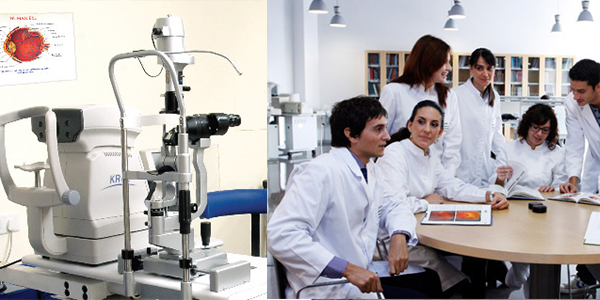Clinical Optometry
Clinical Optometry / Optometrists or optometric physicians are primary eye care and health professionals concerned with vision care. They are experts in determining one’s refractive error and prescribing appropriate correction. They deal with vision screening (eye testing), diagnosis of visual problems, orthoptics and vision training, optometrist counseling of patients with partial sight, color blindness and hereditary vision defects, and designing and fitting of spectacles, contact lens and low vision aids. They also prescribe Vision therapy eye exercises to patients complaining of Visual symptoms such as squint etc.
Though Optometry goes hand in hand with Ophthalmology in treatment of Visual disorders. Optometrists should not be confused with ophthalmologists or dispensing opticians. An optometrist performs all the tasks of an ophthalmologist, short of surgery. Ophthalmologists (Eye M.D’s) are trained physicians specialized in eye and vision care who perform eye surgery, as well as diagnose and treat eye diseases and injuries.
Clinical Optometry Skill Required :
- The ability to understand and apply scientific principles and methods.
- A high degree of accuracy.
- Good organisational and administrative skills.
- The ability to keep up to date with scientific and technological developments.
- Attention to detail.
- Manual dexterity.
- The ability to do repetitive tasks.
- Strong interpersonal and communication skills.
Courses Offered :
- B.Sc. Ophthalmic Techniques (Hons).
- B.Sc. Optometry.
- Bachelor of Optometry and Vision Science (B.O.P.T.M).
- Bachelors Degree in Optometry.
- Diploma in Ophthalmic Assistant.
- Diploma in Ophthalmology.
- Diploma in Optometrical Science (D.O.S).
- Diploma in Optometry.
- M.Ch. Ophthalmology Certification Program.
- Master of Optometry.
- Optician and Refractionist Course.
Subject / Syllabus :
The syllabus for the Bachelor of Clinical Optometry (B. Op-tom) course aims at preparing a primary health care professional, an “Optometrist” who can independently undertake :-
- Estimate refractive errors of the eye and prescribe corrective measures including Spectacles, Contact Lenses, Low Vision Aids and Vision Therapy.
- Detect pathological conditions of the Visual system, which are deviations from normal. Diagnose-ocular and related systemic and neurological diseases and refer the cases to other medical professionals for detailed medical and surgical management.
- Design, manufacture, prescribe and fit all kinds of Optical aids including Spectacles, Sunglasses, Ophthalmic lenses, Contact Lenses, Low Vision aids.
- Examine, diagnose and prescribe treatment for Oculo-motility malfunctions like phorias, tropias and other types of strabismus (squint) and Neuro-muscular anomalies.
- Undertake Public Health Optometry projects and vision screening eye camps in schools, colleges, urban slums, rural areas and also practice occupational Optometry in industries.
- Public education on ocular hygiene and related nutritional and environmental counseling.
- Offer a helping hand and or efficiently manage and successfully run any Ophthalmic clinic, Eye department in hospitals, Optician shops, Optical, Ophthalmic industry & trade.
Eligibility & Admission Process :
The candidate must have completed 10+2 in science stream with 50% marks in Physics, Chemistry, Biology / Maths and English for a Bachelor degree in clinical optometry.
The eligibility criterion for doing diploma course in optometry is a pass in class X or class XII. For those who have taken diploma course in clinical optometry are eligible to get direct admission in the 3rd year of degree course in optometry.
Colleges :
- Aditya Jyot Institute of Optometry, Mumbai.
- All India Institute of Medical Sciences (A.I.I.M.S), New Delhi.
- Academi of Optometrist, Kolkata.
- Al Salama College of Optometry (A.S.C.O), Perintalmanna, Kerala.
- All India Institute of Optometrical Sciences (A.I.I.O.S), Kolkata.
- Bausch & Lomb School of Optometry, Hyderabad.
- Bejan Singh Institute of Optometry.
- Bharati Vidyapeeth’s Medical College, Pune.
- Chitkara school of Health Sciences,Rajpura (Chitkara University Punjab).
- College of Optometry and Ophthalmic Sciences, Nasik.
- College of Optometry, Miraj, Maharashtra.
- Dr. Anand College of Optometry and Vision Science at Salem, in collaboration with Periyar University in Tamil Nadu.
- Elite School of Optometry, Chennai.
- George College of Management and Science, Kolkata.
- Government Medical College and Hospital, Chandigarh.
- Harijyot college of optometry, Navsari, Gujarat.
- Hyderabad Central University.
- I.G.O.N.University, Delhi.
- Institute of Eye Care.
- J.N.R.V.University, Udaipur, Rajasthan.
- Lions Arvind Institute of Community Ophthalmology, Madurai.
- Lotus Bausch & Lomb Institute of Optometry, Lotus Eye Care Hospital, Coimbatore.
- M.N.College of Optometry, Chennai.
- Malabar College of Health Education, Bharathiyar University, Calicut, Kerala.
- Manipal College of Allied Health Sciences, Manipal University, Manipal.
- MEH School of Optometry, Mumbai.
- Nagar School of Optometry, Ahmedabad.
- Nethradhama school of optometry, Bangalore.
- NIMS University, Udaipur, Rajasthan.
- AAA University (B. Op-tom) Allahabad, U.P.
- NSHM Knowledge Campus (Dept. of Optometry & Vision Science), Durgapur, West Bengal.
- Optometry Research & Training Institute (O.R.T.I), Uttar Pradesh.
- Pailan college of management & technology joka, kolkata.
- Rayhan Eye Hospital & Laser center, Edappal,Malappuram District,Kerala Under I.G.N.O.U & Bharathiar University.
- Sankara College of Optometry, Bangalore (A unit of Sankara Eye Care Institutions, India).
- Sarojini Devi Eye Hospital & Institute of Ophthalmology, Hyderabad.
- Schells Eye Hospital (Unit of Christian Medical College), Vellore.
- Shri Prakash Institute of Optometry (Unit of Dr. Agarwal’s Eye Hospital & Eye Research Center) ,19 Cathedral Road, Chennai.
Job Prospects & Salaries :
Optometrists are trained professionals involved in the treatment of visual defects with the help of optical instruments. They conduct eye tests to examine a patient’s vision and prescribe eyeglasses and contact lenses. Provide vision therapy and low-vision rehabilitation. Apart from these, they also operate machines for work such as polishing edges, hardening and adjusting the sizes of lenses. To manage any optical trade including primary dispensing of spectacles, a professional education in Ophthalmic Optics (Optometry) is essential. It is a profession which offers job flexibility, regular working hours and financial stability.
After completing the course on Optometry, an Optometrist has various career opportunities. They can establish an independent practice by starting their own eye clinic, optical shop, lens manufacturing unit etc. They can work with Optician showrooms, Eye doctors, Contact Lens and Ophthalmic lens industry, hospital Eye departments etc. Optometrists can also seek employment with any multi national organization dealing with eye care products as professional services executives or take up teaching as a career. They can pursue higher education or can go for further research in the field of Optometry. Optometrists could also take up the work of occupational health specialists in the vision care of industrial workers.
Remuneration :
Optometry is one of the top ten income-earning professions in the country today. An optometrists earning is determined by several factors including coverage under provincial medical programs, fee schedules, hours worked, practice location, services provided and patient population. The initial salary of an optometrist in a government firm is Rs. 8000/- or above plus other allowance. Salaried optometrists tend to earn more initially than optometrists who set up their own practices. However, ultimately those in private practice once established usually earn more.





